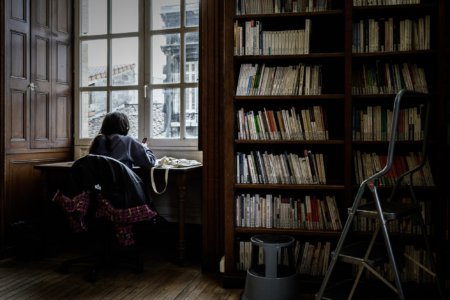
Before becoming a mental health advocate, Akiko Inoshima from Japan was struggling with anxiety and depression herself.
She was spending months in a hospital bed. The pressure to succeed in high school had pushed her past her breaking point.
It was a dark and lonely time. But instead of letting it define her, she is using that experience as her motivation to get into some of the world’s best schools, win scholarships, and fight for others.

Mental health advocate Akiko Inoshima loves music. In the photo, she attends a music event where she learned how AI affects music. Source: Akiko Inoshima
‘Seeing so many of my friends suffering really hurt’
When Inoshima was 16, she had to be hospitalised for a long period — long enough that she was forced to drop out of her public high school in Japan.
What came next was no easier. Japan’s welfare system had little in place to support students who, like her, were forced to step away from education due to extended psychiatric care.
“Stays in psychiatric hospitals tend to be long and are often conducted without the patient’s consent,” she says. “There was no real safety net for people in my situation.”
Even after her discharge, her hospitalisation would continue to haunt her, even years later.
“Japanese companies have a very unique recruitment system. They prioritise extracurricular activities instead of academic achievements,” she says.
They look at your age too. Inoshima is turning 27 in 2025, and many employers already think that’s “too old.”
In a LinkedIn post, she shares her frustrations:
“As someone who does not fit, I have painfully realised that overcoming numerous adversities is often viewed not as a strength, but as a ‘negative deviation’ from the standard path. This reality has left me feeling very sad and worn out.”
Her environment didn’t help too. Japan has one of the highest suicide rates in the world, especially among youth.
In 2024, data from the Japan National Police Agency showed 527 students from elementary to high school committed suicide.
“I’ve seen so many friends and relatives suffer in silence,” Inoshima says. “They weren’t understood by their families or society, and the care they received was far from enough.”
Her experiences motivated her to change this, but not through the common route like counselling or psychology.
She wanted to change the system itself which was why she went into welfare policy and international human rights law.
Back then, she saw that Asian societies still stigmatise mental illness and do not focus enough on recovery and human rights.
Things are better now. Now the mental health advocate is seeing civil societies here pressure governments and mental health professionals to comply with international human rights treaties.
“Even China signed the UN Convention on the Rights of Persons with Disabilities (UNCRPD), which includes people with mental illnesses and disabilities,” she says. “That means regional cooperation is more important than ever.”
The UNCRPD is the first global agreement that protects the rights of people with disabilities. It sets basic standards and gives advice to countries on how to treat everyone equally.
There is still one problem though. “Japan and China have vastly different legal systems,” Inoshima says. “It’s nearly impossible for Japanese civil society to engage directly with our Chinese counterparts.”
And so she took matters into her own hands. She joined the Collective Action for Mobility Programme of University Students in Asia (CAMPUS Asia) and pursued a Master of Law in International Studies at Peking University.

Being a mental health advocate has opened many doors for Inoshima. One of them was joining a student forum with peers from Japan and China to talk about volunteer work and international aid. Source: Akiko Inoshima
Learning how to become a mental health advocate in the unlikeliest place
CAMPUS Asia is a tri-national educational initiative between Japan, China, and South Korea. The programme lets you study in more than one country and even graduate with multiple master’s degrees.
Inoshima went to Peking University, ranked #14 in the world.
China may not be known for its mental health advocacy, but this experience would prove to be vital in Inoshima’s mission to fight for her cause.
Knowing how legal frameworks in East Asia work and how to talk about human rights made her research stronger and her message more powerful.
“It was incredibly helpful,” she says. “I learned about China’s domestic laws concerning welfare policies, how they plan to incorporate international human rights standards, and how local organisations work together to put those policies into action.”

In addition to her work as a mental health advocate, Inoshima took the time to volunteer at an elderly care home in Beijing. Source: Akiko Inoshima
Winning one of the most prestigious scholarships in the world
In 2024, Inoshima was selected as a principal candidate for the Fulbright Scholarship.
Backed by the US government, the scholarship offers full funding for students, scholars, and professionals to conduct research, teach, or pursue studies in the US and other partner countries.
“It was always my goal to build my academic career in this field, which is why I applied for PhD programmes in the US,” she says.
“Receiving the scholarship is like getting a seal of approval from the US government, that they trust the person to contribute meaningfully to society and academia,” she explains.
However, because of the current US administration, Inoshima was declined by every programme.
This outcome stunned even her Ivy League advisor, who said it was unheard of to reject a Fulbright scholar.
Part of what makes Fulbright scholars so desirable is that they funded by the US government. The scholarship covers the visa, insurance, and living expenses, lifting the financial burden from universities.
It should’ve made Inoshima a perfect fit, but she suspects another factor played a role: her academic background.
“With US-China relations at an all-time low, I can’t help but feel like I was caught in the middle,” she says. “Instead of being judged for my work, I was judged for where I studied.”

Inoshima believes that being a good mental health advocate means understanding people’s history. That’s why she visits historical sites in China to learn about the pain caused by Japan’s past invasion and rule. Source: Akiko Inoshima
Pushing for mental health reform in Asia
Inoshima could have been discouraged by the rejection. But she isn’t.
“Being named a Fulbright principal candidate was still a huge milestone,” she says. “And most recruiters know what’s going on in the US right now, so they’re usually very understanding about my situation.”
Even if she had been accepted, she wouldn’t have been able to do the health policy research she’s passionate about.
Studies on HIV, cancer, Amyotrophic lateral sclerosis (ALS), and even the Yale Global Healthcare study have faced budget cuts.
That’s why she has no regrets as all. “What really makes me stand out was how I combined academics with civil society work across Japan, South Korea, and even mainland China,” she says.
“It’s rare to have someone who’s been involved in all three regions, and even rarer to find someone who can communicate fluently in English while doing that work.”
Her journey’s come full circle; in 2025, she graduated from her LLM programme and has made a difference as a mental health advocate too.
She’s been a Youth Member with TCI Global, representing Japanese youth with psychosocial disabilities, and a Lived Experience Advisor with PLOS Mental Health, where she helps make academic research more inclusive.
Most recently, she joined the Japanese Society for the Elimination of Barriers to Mental Health as a project member.
She helped develop the “Political Parties Public Questionnaire Project,” that surveyed and shared the mental health policies of political parties.










